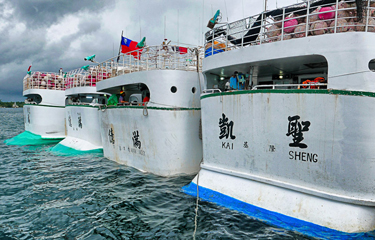Taiwanese fishing groups complain NGOs are ignoring industry efforts, endangering future progress

Taiwanese fishing representatives have issued a joint statement to protest the treatment they have received from non-governmental organizations including the Seafood Working Group and Greenpeace.
The Taiwan Deepsea Tuna Longline Boatowners and Exporters Association, Taiwan Squid Fishery Association, Taiwan Tuna Purse Seiners Association, Taiwan Tuna Longline Association, and Distant Fisheries Youth Association said the industry’s continuing efforts on labor are “simply ignored” by the campaign groups.
“Instead, they request that Taiwan be downgraded to Tier 2 ranking in the 2022 U.S. [State Department] Trafficking in Persons Report, which is a huge disappointment for all of us,” they said in a joint statement provided to SeafoodSource.
Global Labor Justice – International Labor Rights Forum (GLJ-ILRF) and Greenpeace Taiwan, on behalf of the Seafood Working Group (SWG), are demanding Taiwan be named a Tier 2 country in the U.S. State Department’s upcoming Trafficking in Persons (TIP) Report, set to be published this summer. The U.S. State Department describes as the document as the “U.S. government’s principal diplomatic tool to engage foreign governments on human trafficking.”
The statement, which was provided by Tony (Han-Yu) Lin, the section chief of the Taiwan Deepsea Tuna Longline Boatowners and Exporters Association, said criticism from NGOs “will only lead to no progress or advancement in improving fisheries and human rights protection.”
It suggests that “relevant NGOs should not impose the pressure of downgrading Taiwan’s tier ranking on Taiwan distant-water fisheries, and dismiss the continuous efforts on improving fisheries and human rights made by the industry and the [Taiwan] Fisheries Agency through various ways.”
The statement claims that since 2017, Taiwanese fishing industry organizations have been working harder to listen to and share information with the NGOs “and implemented relevant improvement actions.”
“The challenges arising from the distinct nature of distant-water fisheries cannot be simply overcome by one single government body or one policy or regulation; It is only possible through discussions with the understanding of the nature of fisheries that a crew recruitment and management model, which suits the need of Taiwan’s distant-water fleet and international requirements, could be found,” it said.
The industry statement points to 15 actions by Taiwan’s fishing firms, including a bid to obtain the Marine Stewardship Council (MSC) certification and participate in a fishery improvement project (FIP) and participating in pilot projects on electronic monitoring system run by international fisheries management organizations and Taiwan-based researchers. The statement also points to various other pilot programs including “pilot projects on seabird mitigation measures run by domestic and international seabird associations.”
Citing sanctioning of certain Taiwanese fishing firms by the U.S. and European Union on illegal fishing and labor abuses, the industry statement also suggests that Taiwanese fisheries organizations will increase communications with “crew-members’ home country governments, seafarers’ organizations, recruitment agencies and training centers” with the goal of crafting “practical measures” to protect workers. It said it had achieved a consensus between industry, regulators, and NGOs to establish a minimum salary review committee for the very first time.
“It is agreed that the committee will invite representatives from crews, the industry, and scholars to discuss and adjust, if necessary, the minimum salary so as to balance the need of the industry and human rights protection,” the statement said.
Additionally, the statement requests more aid from the Taiwanese government to help fix the fleet’s problems.
“Taiwan’s distant-water fisheries are now facing serious challenges, including excessive number of vessels, insufficient catch quotas, unceasing pandemic of COVID-19, spiking price of diesel due to war between Ukraine and Russia, and the exchange rate of Japanese yen hitting a record low, all of which have been plaguing the fishing industry,” it said. “Therefore, we urge the Executive Yuan, the Council of Agriculture, and the Fisheries Agency to support and provide more incentives and guidance to Taiwan’s distant-water fisheries so as to completely transform and advance the fishing industry under the National Action Plan on Fisheries and Human Rights and to maximize public interests through improving human rights protection and facilitating sustainable development of fisheries.”
SeafoodSource has contacted the NGOs cited in the statement for comment, but has not yet received a response as of 28 April.
Photo courtesy of Francisco Blaha






Share